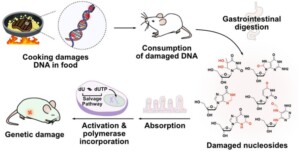Written by A. Hammouda: Cancer is a group of diseases that can affect any part of the body. It is one of the leading causes of death worldwide. Despite that, can one lead a healthy, cancer-free life?
Healthy cooking and eating habits may give a cancer-free life
One of the most important factors that can influence our cancer risk is our diet. We can lower our risk of getting cancer by making healthy choices, especially in our cooking and eating habits. What we eat and how we prepare it can have a significant impact on our health and well-being. Many recommendations have already been made and published everywhere for a cancer-deterring diet.
Cancer starts in genes
Cancer occurs when abnormal cells grow and spread uncontrollably, damaging healthy tissues and organs. It begins with changes in the DNA of cells. DNA makes the genes that control how cells function and grow. When genes become damaged or mutated, they can cause cells to grow abnormally and form tumors.
Cooking methods may affect our genes
The relationship between diet and DNA is complex and fascinating. By understanding how food can change our genes, we can make better choices for ourselves and future generations. The consumption of foods prepared at high temperatures has been associated with numerous health risks. To date, the chief identified source of risk has been small molecules produced in trace levels by cooking and reacting with healthy DNA upon consumption. A recent article draws attention to damaged DNA in the diet as a source of genetic modification.
The researchers hypothesized that high-temperature cooking may cause significant damage to the DNA in food, and this damage might find its way into cellular DNA by metabolic salvage. They tested cooked and raw foods and found high levels of hydrolytic and oxidative damage to all four DNA bases upon cooking. Exposing cultured cells to damaged 2′-deoxynucleosides (particularly pyrimidines) resulted in elevated DNA damage and repair responses in the cells. Feeding a deaminated 2′-deoxynucleoside (2′-deoxyuridine), and DNA containing it, to mice resulted in substantial uptake into intestinal genomic DNA and promoted double-strand chromosomal breaks there.
The results of this research suggest the possibility of a previously unrecognized pathway whereby high-temperature cooking may contribute to genetic risks. These results prompt the need for further studies to assess the effects of long-term exposure at lower concentrations to determine which specific damaged DNA species are of greatest concern.
How to cook for a cancer-free life?
The findings of this study suggest that we should be careful about how we cook our food, especially meat, fish, eggs, and dairy products. These foods contain high amounts of protein and nucleic acids that can be damaged by heat. Cooking methods that use lower temperatures, such as steaming, boiling, poaching, or baking, are preferable to frying, grilling, roasting, or broiling. These methods can reduce the formation of harmful compounds and preserve the nutritional value of food.
Another way to protect our DNA from damage is to eat more fruits and vegetables. These foods are rich in antioxidants, phytochemicals, vitamins, minerals, and fiber that can help prevent oxidative stress and inflammation in our cells. They can also modulate the expression of genes involved in cell growth, differentiation, apoptosis, and DNA repair.
Cooking is not only an art but also a science. By choosing the right ingredients and methods, we can enjoy delicious meals that can also boost our health and lower our cancer risk. Remember: you are what you eat!
Go to the News Board
